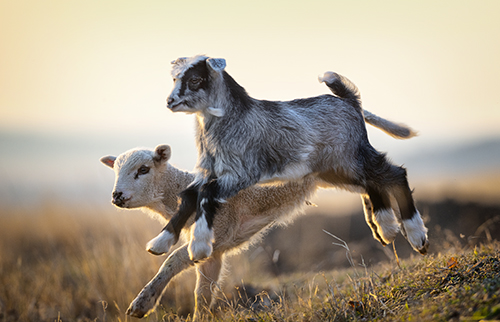Mineral Nutrition for Small Ruminants
May 03, 2021

Throughout history sheep and goats have often been viewed as secondary animals able to survive on lower quality forages left behind by cattle or other livestock species. While it is true that small ruminants are capable of utilizing less-desirable forages, it does not mean their nutritional needs can be ignored if animal performance is a consideration. Modern breeds, with their enhanced genetic potential to grow faster and produce more milk, require more than just a minimal level of nutrition. Knowledgeable producers understand the positive impact of supplemental vitamin/mineral nutrition on health, reproduction, and growth, and will provide supplements in some form. But because of the variety of information and products available, this intent to do the right thing can sometimes lead to unintended consequences. Following are just a few items to consider when providing free-choice vitamin/mineral supplements to sheep and goats:
- Salt (sodium) is the only mineral element for which animals have an innate desire. They will seek it out in their environment, yet not normally overconsume. Feed manufacturers take advantage of this characteristic to both encourage and limit overconsumption of free-choice supplements to achieve a targeted level of intake. Adding or blending additional salt into a vitamin/trace mineral supplement at the farm is not recommended since it only serves to dilute the mineral and further reduce consumption.
- Trace mineral salt, while relatively inexpensive, should not be considered an adequate vitamin/mineral supplement. Typically containing 90-95% salt, low levels of trace minerals, and no vitamins, it will not meet the requirements when consumed free-choice by the animal. In this instance, you do get what you pay for.
- An important difference between sheep and goats is that sheep are more susceptible to copper toxicity. Therefore, supplements intended for sheep generally contain no added copper. Sheep do have a requirement for copper, but the quantity is so small that the amount provided by forage alone is usually adequate. Any additional copper over and above the requirement accumulates in the liver and can eventually reach a lethal level, thus the general recommendation that sheep receive no supplemental copper.
- It’s also worth noting that the administration of copper oxide wire particles is gaining popularity as an aid to parasite control, particularly in situations where the overuse of dewormers has led to anthelmintic resistance. Although the exact mode of action is not fully understood, the copper oxide is slowly released into the digestive tract where it has been shown to reduce the numbers of certain parasites. This fact, however, does not validate the use of excessive levels of copper in mineral supplements. Organic forms of copper and copper sulfate are much more readily absorbed than copper oxide, and feeding levels in excess of the requirement can put even goats at risk of copper toxicity.